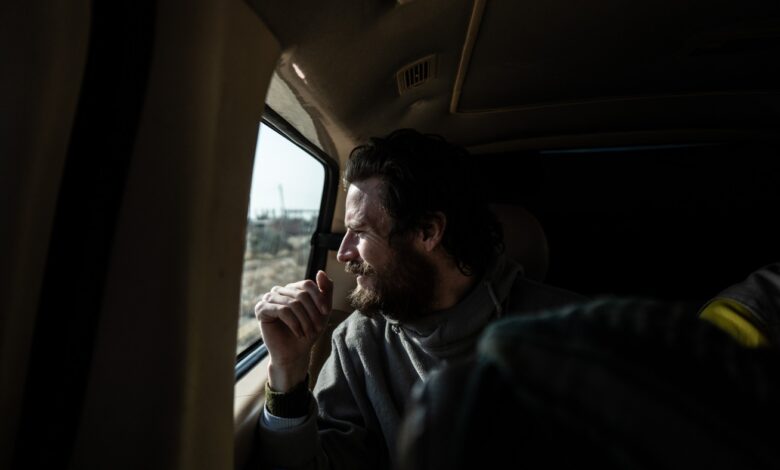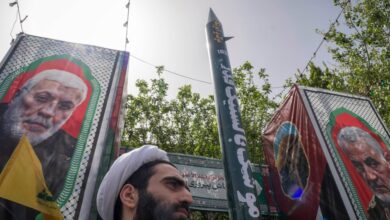American Travis Timmerman is handed over to U.S. forces in Syria : NPR


Travis Timmerman looks out the window of a van as he is taken to be handed over to U.S. forces near the Syrian border with Iraq and Jordan on Dec. 13.
Manu Brabo for NPR
hide caption
toggle caption
Manu Brabo for NPR
ALONG THE M2 HIGHWAY in southern Syria — The journey of a young Missouri man freed from a Syrian prison when the regime fell earlier this month began with a wilderness religious pilgrimage earlier this year and ended on a remote desert highway. That is where he was handed over to U.S. custody on Friday.
A U.S. fighter jet flew overhead as the American man walked with an official from Syria’s interim government to meet U.S. special forces positioned in front of MRAP armored vehicles on the deserted highway.
The former lawyer and writer is known as Pete Timmerman to Missouri authorities who were searching for him. But he just calls himself Travis.

Syrian forces with Hayat Tahrir al-Sham, which led the overthrow of Bashar al-Assad’s regime, secure the area where Timmerman is transferred to U.S. forces near the Syrian border with Iraq and Jordan.
Manu Brabo for NPR
hide caption
toggle caption
Manu Brabo for NPR
A U.S. special forces operative frisked Timmerman for weapons, and then a commanding officer asked him to confirm his identity.
Asked for his full name, he said, “Just Travis.”
Timmerman, 29, confirmed he had been held in detention for seven months and that he had entered Syria from Lebanon.
With that, the officer reached out his hand and said, “Travis — welcome home.”
After hugging a Syrian American activist, the Syrian official and some of the Syrian fighters who had been taking care of him, Timmerman was escorted into one of the American armored vehicles and driven away.

Timmerman gets out of a van ahead of his transfer to U.S. forces on the desert highway on Friday.
Manu Brabo for NPR
hide caption
toggle caption
Manu Brabo for NPR
Earlier in the day, NPR had accompanied the convoy bringing Timmerman from Damascus to southern Syria, near a U.S. base not far from the Jordanian border. Over breakfast before the convoy departed, Timmerman spoke with NPR about his time in prison, his Christian faith — and what drove him to Syria.
Eating olives, he used one of his long fingernails to carefully scrape all the flesh from the pit, as he did in prison to avoid wasting any of them.
Timmerman said he did not want to give formal interviews or have his voice recorded because it did not fit with the spiritual modesty he worked to cultivate. He allowed photos to be taken. He said he spent much of his time in prison meditating, achieving a spiritual clarity that he had never had.
“My world changed,” he said.

Abandoned Syrian military vehicles on the road to the location where Timmerman was handed over to U.S. forces.
Manu Brabo for NPR
hide caption
toggle caption
Manu Brabo for NPR
In the Syrian prison, he said, he reflected on his life before his arrest. He had been a lawyer in Chicago, practicing family law and writing what he described as a coming-of-age novel. He said he does not plan to publish the novel because he is not interested in commercial ventures.
“God has since called me to serve him,” he said.
Timmerman had told his mother when he left the U.S. that he was going to Hungary. He did not want to worry her. Instead, he traveled to Beirut via the Czech Republic and walked across the border into Syria with a smuggler. He was arrested after fasting for three days in the Syrian mountains, when he went to gather cherries from an orchard and was spotted by a border guard.

Timmerman (center) walks with Mouaz Moustafa (left) and an interim Syrian government official before his handover to U.S. forces in southern Syria on Friday.
Manu Brabo for NPR
hide caption
toggle caption
Manu Brabo for NPR
He says he is now a better person because of the time he spent in prison.
When NPR contacted Timmerman’s mother, Stacey Collins Gardiner, she said: “Tell him I love him very, very much and I’ve been crying for him every day. I’ve been a nervous wreck, it’s just been crazy for me.”
After his release along with other detainees when the regime of Bashar al-Assad fell, Timmerman was found walking barefoot in a Damascus suburb. The family of a Syrian woman who was also freed took him to their home and gave him tea and oranges.
When Mouaz Moustafa, a Syrian American activist, learned that an American had been found, he contacted U.S. officials and brought Travis to Syria’s foreign ministry. There Timmerman had his first shower in seven months. Foreign ministry staff bought him running shoes and new clothes.

Free Syrian Army members escort the convoy taking Timmerman to be handed over to U.S. forces on Friday.
Manu Brabo for NPR
hide caption
toggle caption
Manu Brabo for NPR
“The new government in Damascus is acting in good faith,” said Moustafa, director of the Syrian Emergency Task Force. “But this illustrates the importance that there need to be official delegations to Damascus.”
The U.S. has no direct diplomatic presence in Syria. Moustafa said he knows of at least six other Americans missing in Syria. He believes that others, not imprisoned, have never been formally reported as missing.
“No one knew that Travis was in Syria when he went missing,” he said.
Bill Chappell contributed to this story from Washington, D.C.
https://npr.brightspotcdn.com/dims3/default/strip/false/crop/2048×1152+0+107/resize/1400/quality/100/format/jpeg/?url=http%3A%2F%2Fnpr-brightspot.s3.amazonaws.com%2Fd0%2Fd1%2Fea52b627491ca61db1ee1bf532fa%2Fzmb10.jpg
2024-12-13 16:16:49





